Thomas James Richards, Diaries, Transcript Vol. 3, 26 January to 8 November 1916 - Part 13
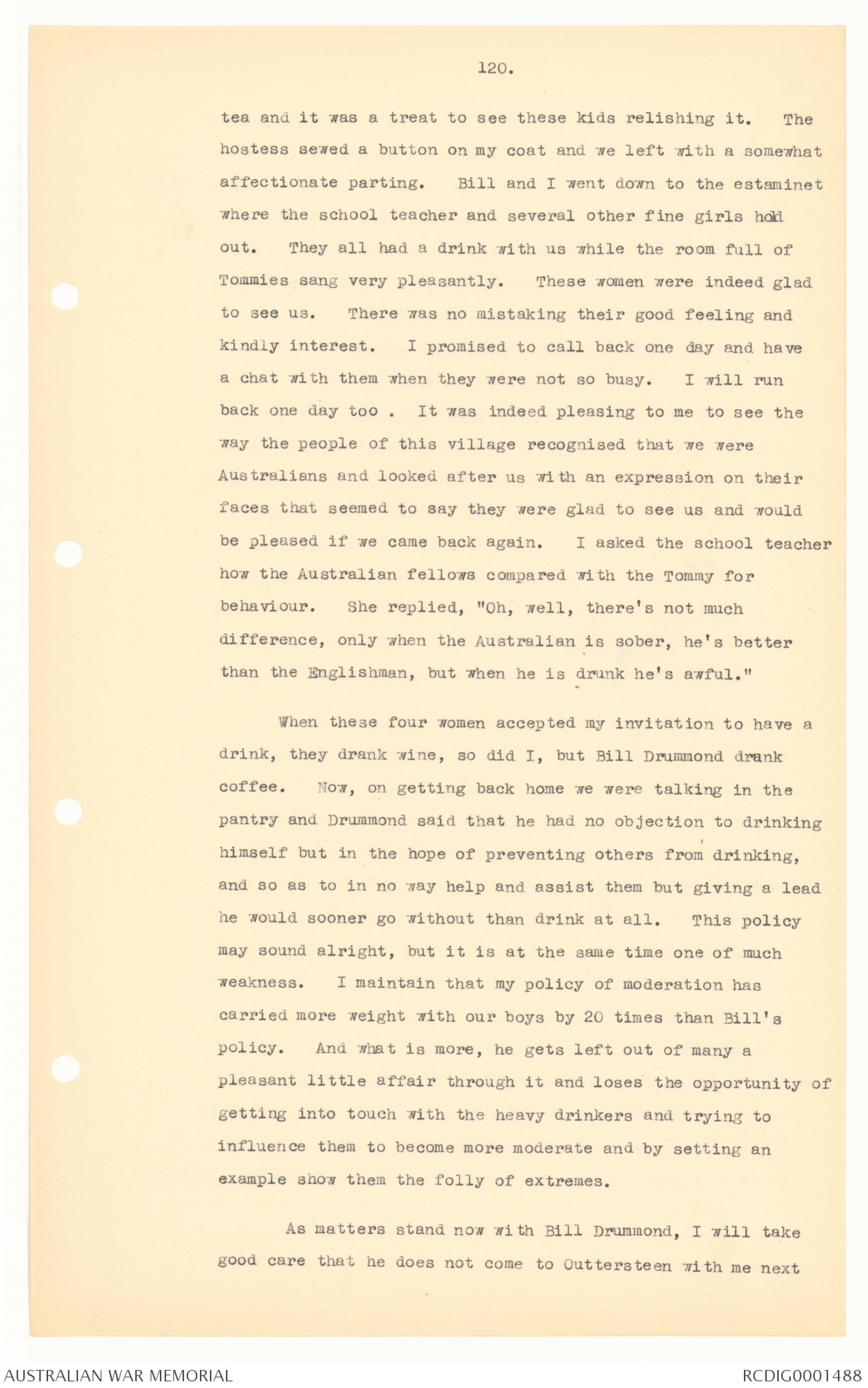
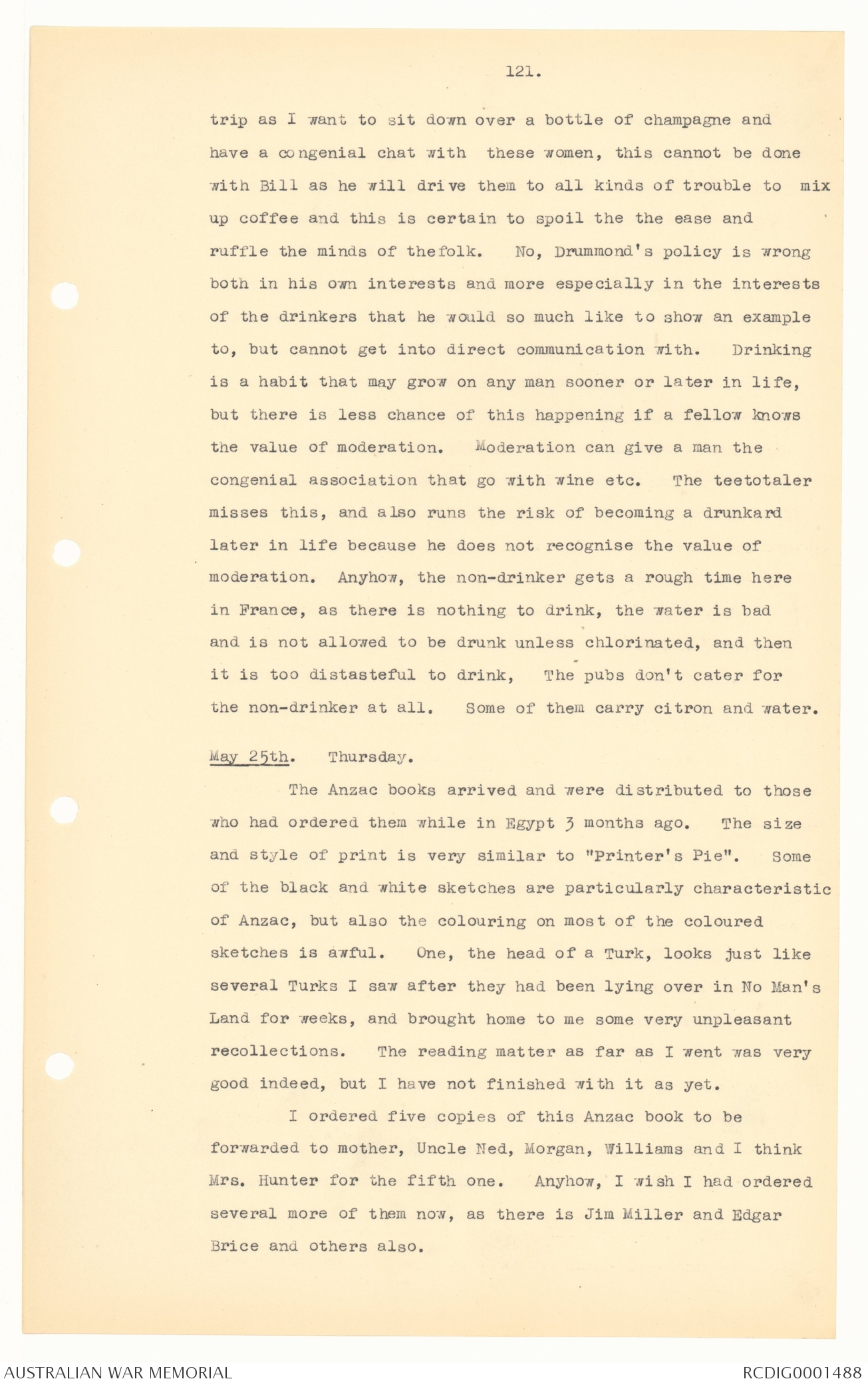
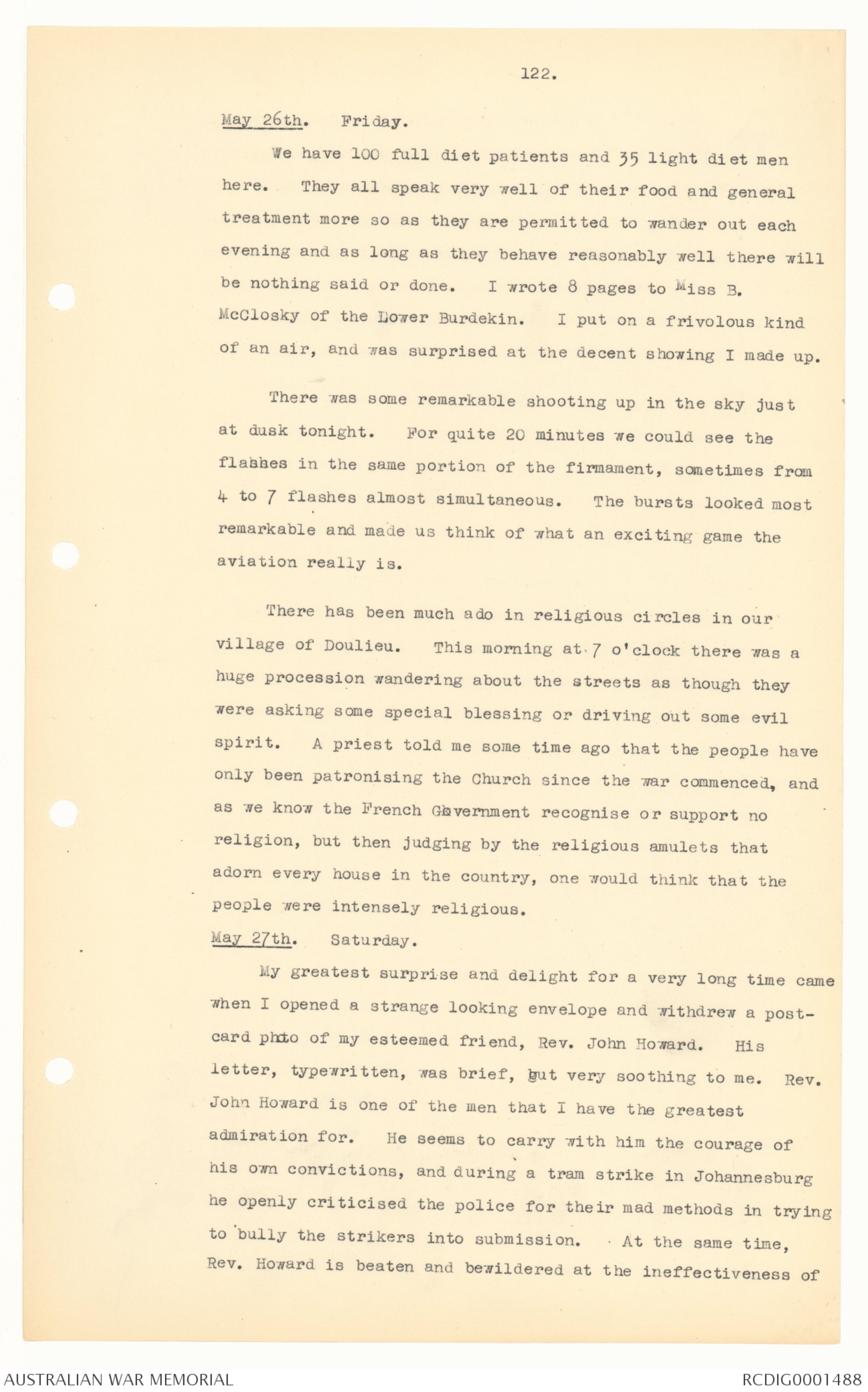
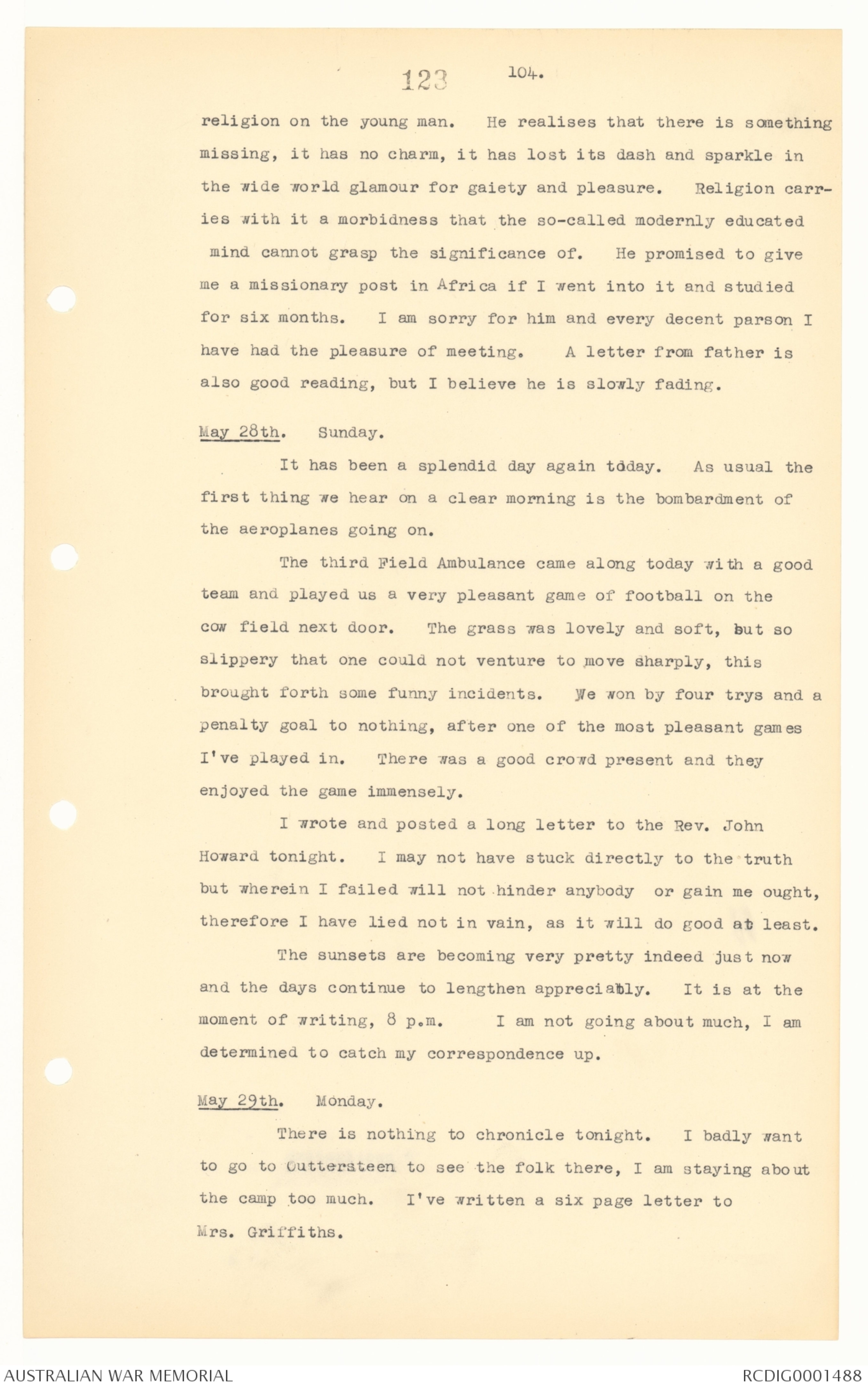
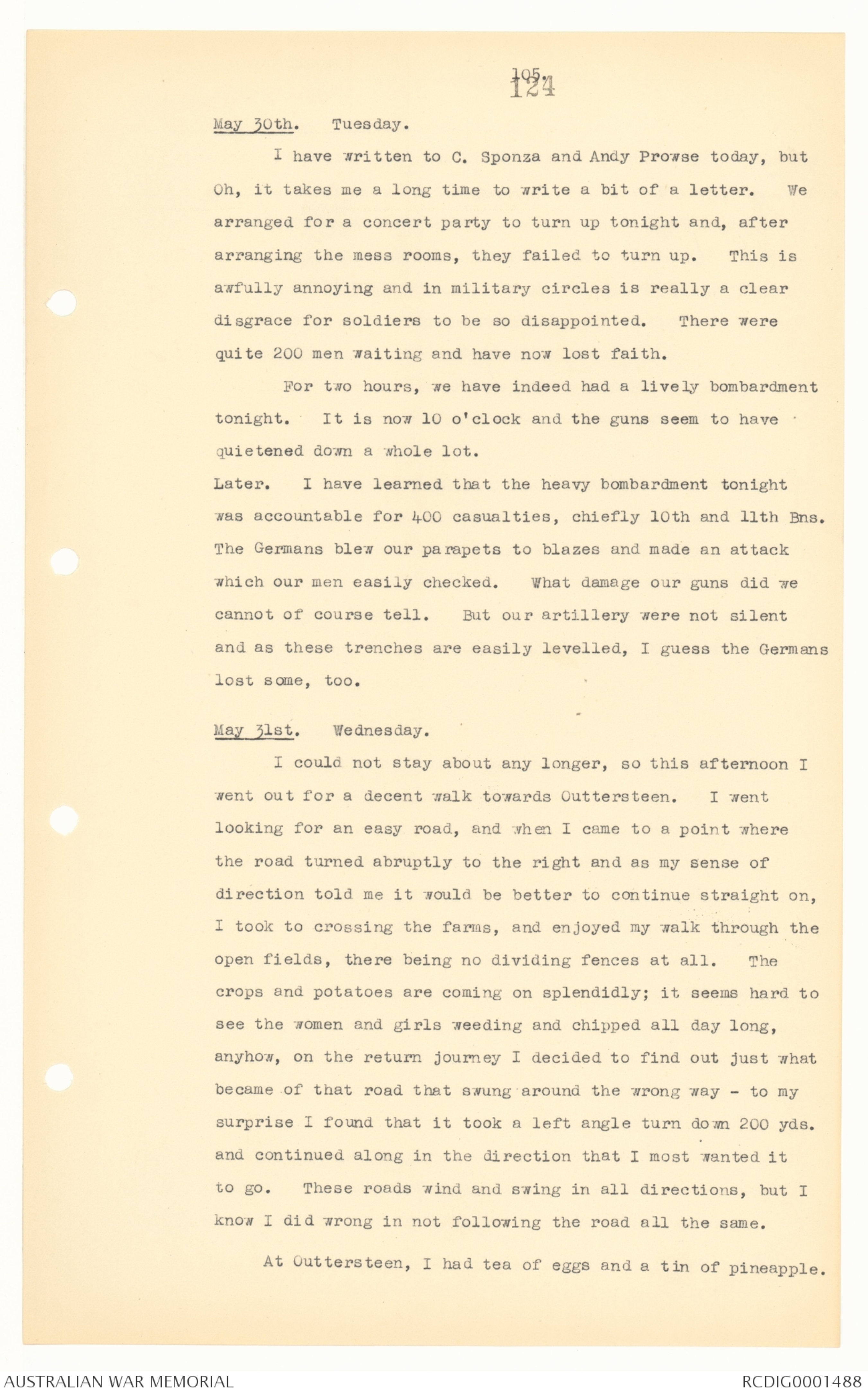
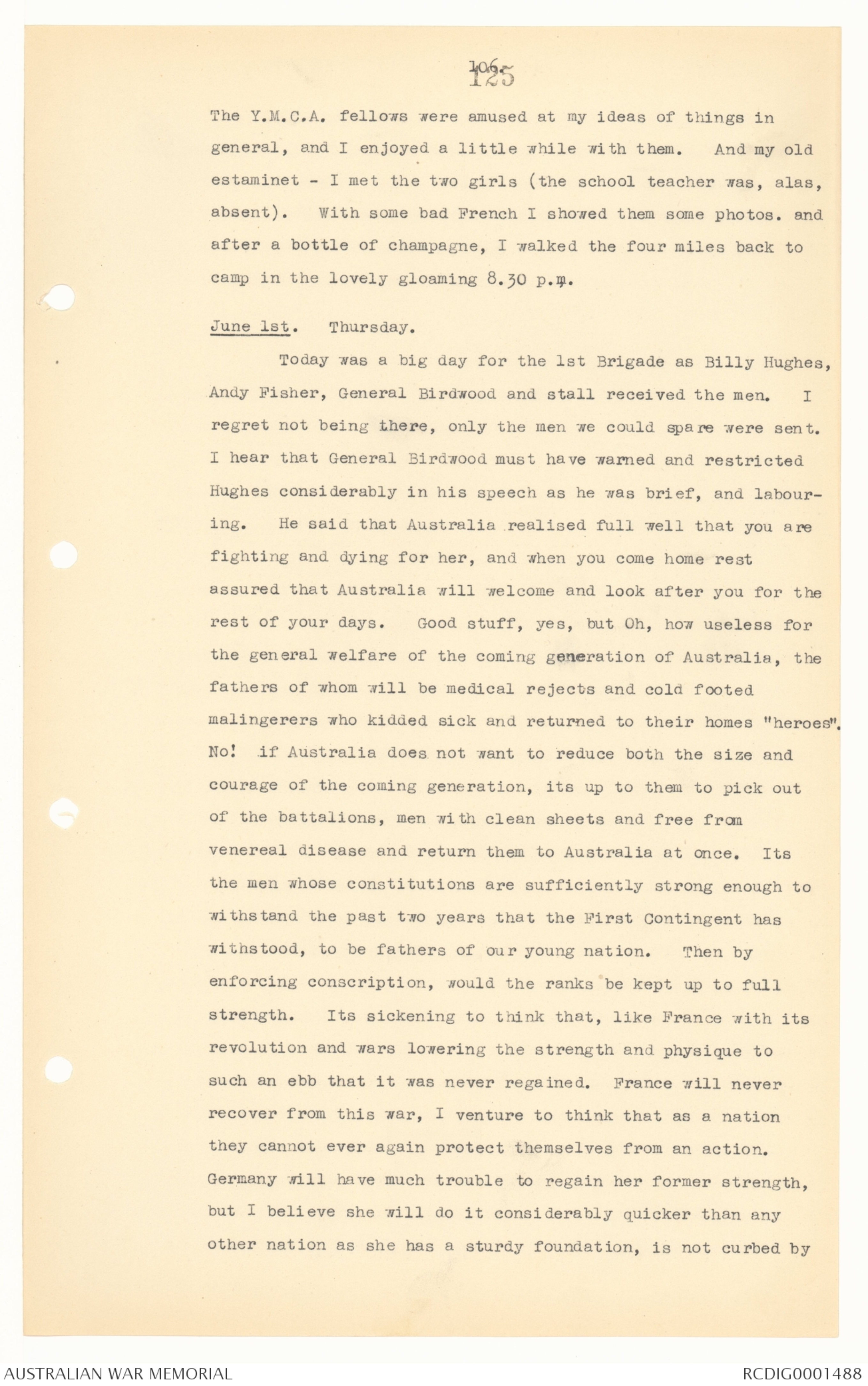
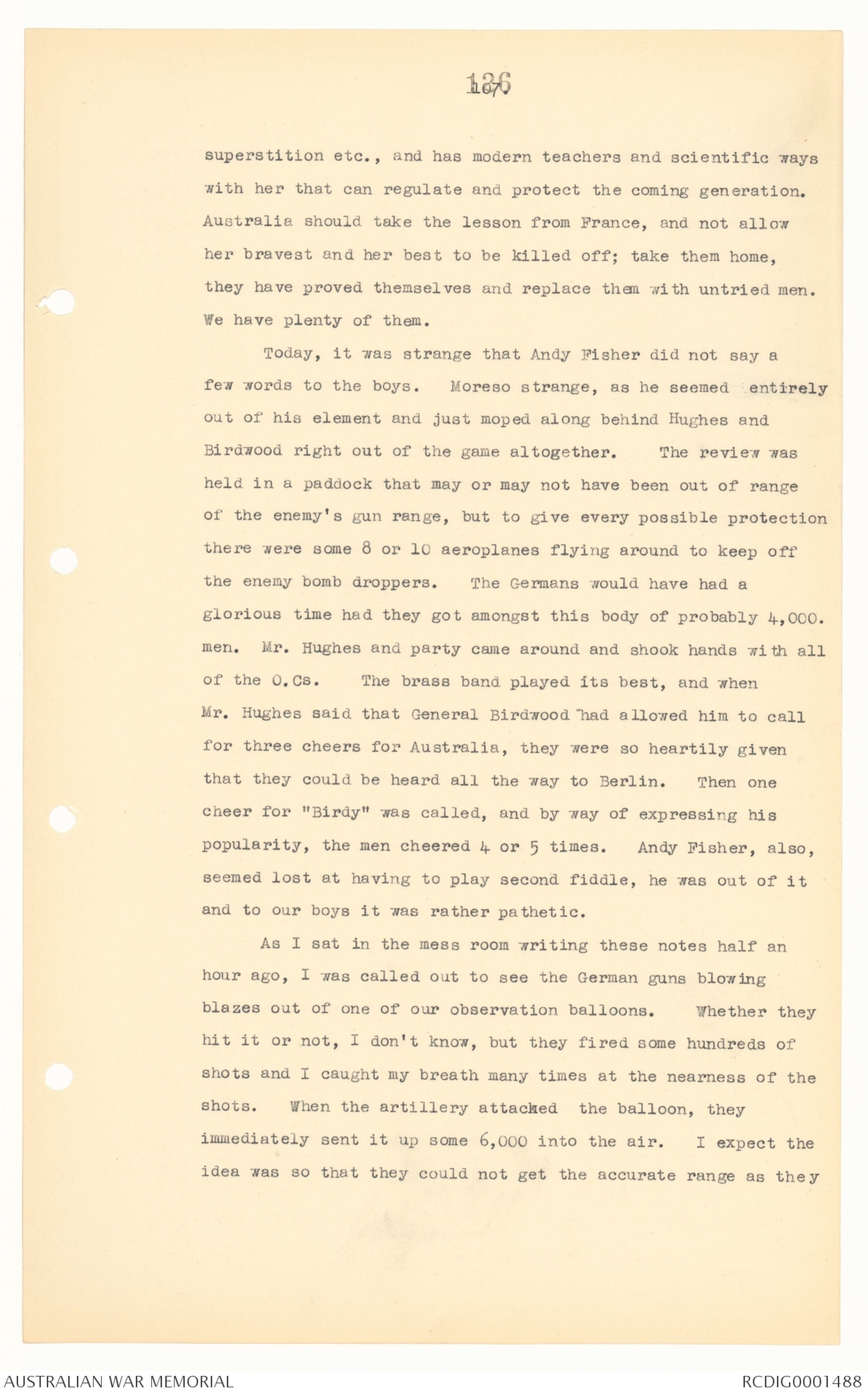
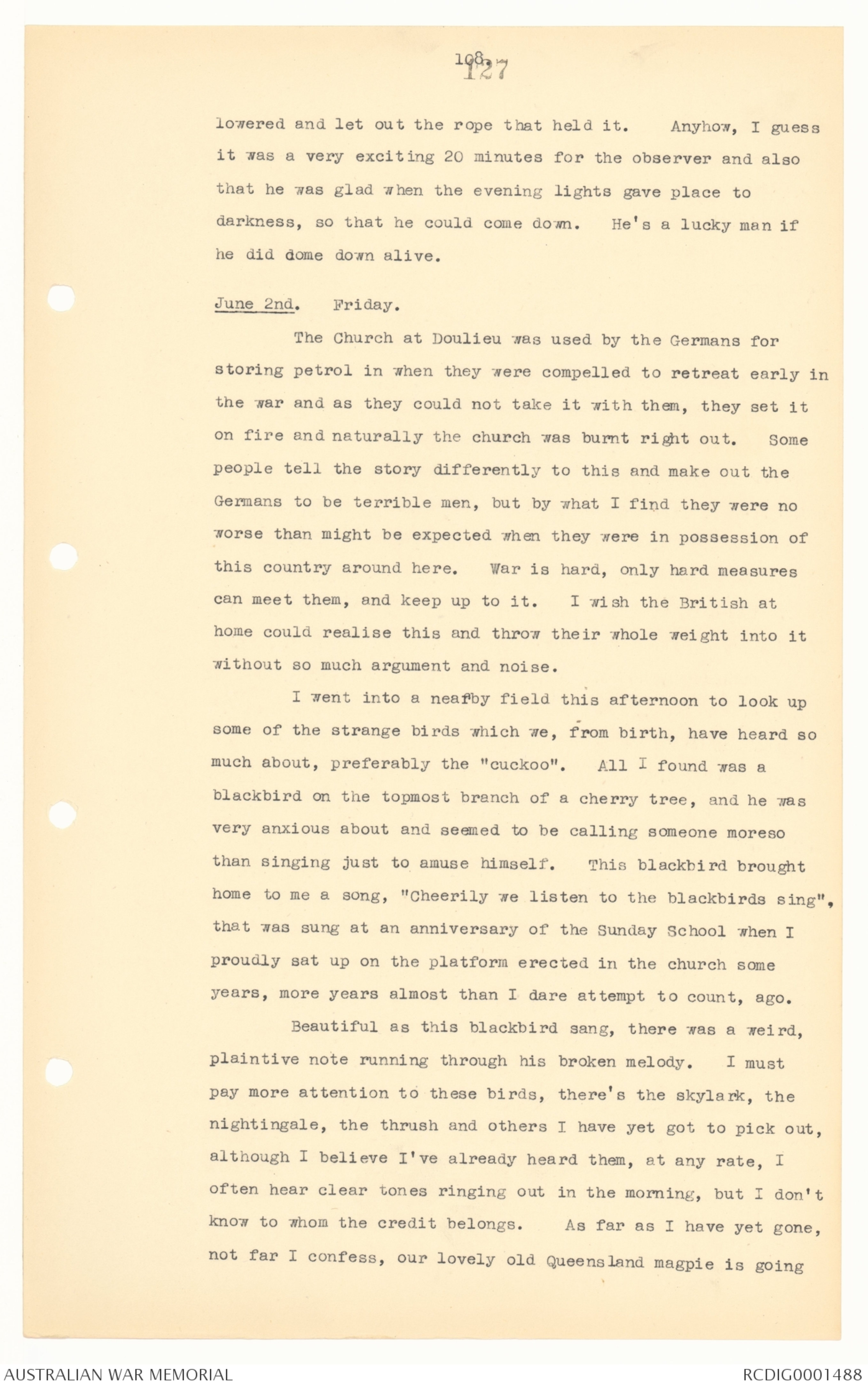
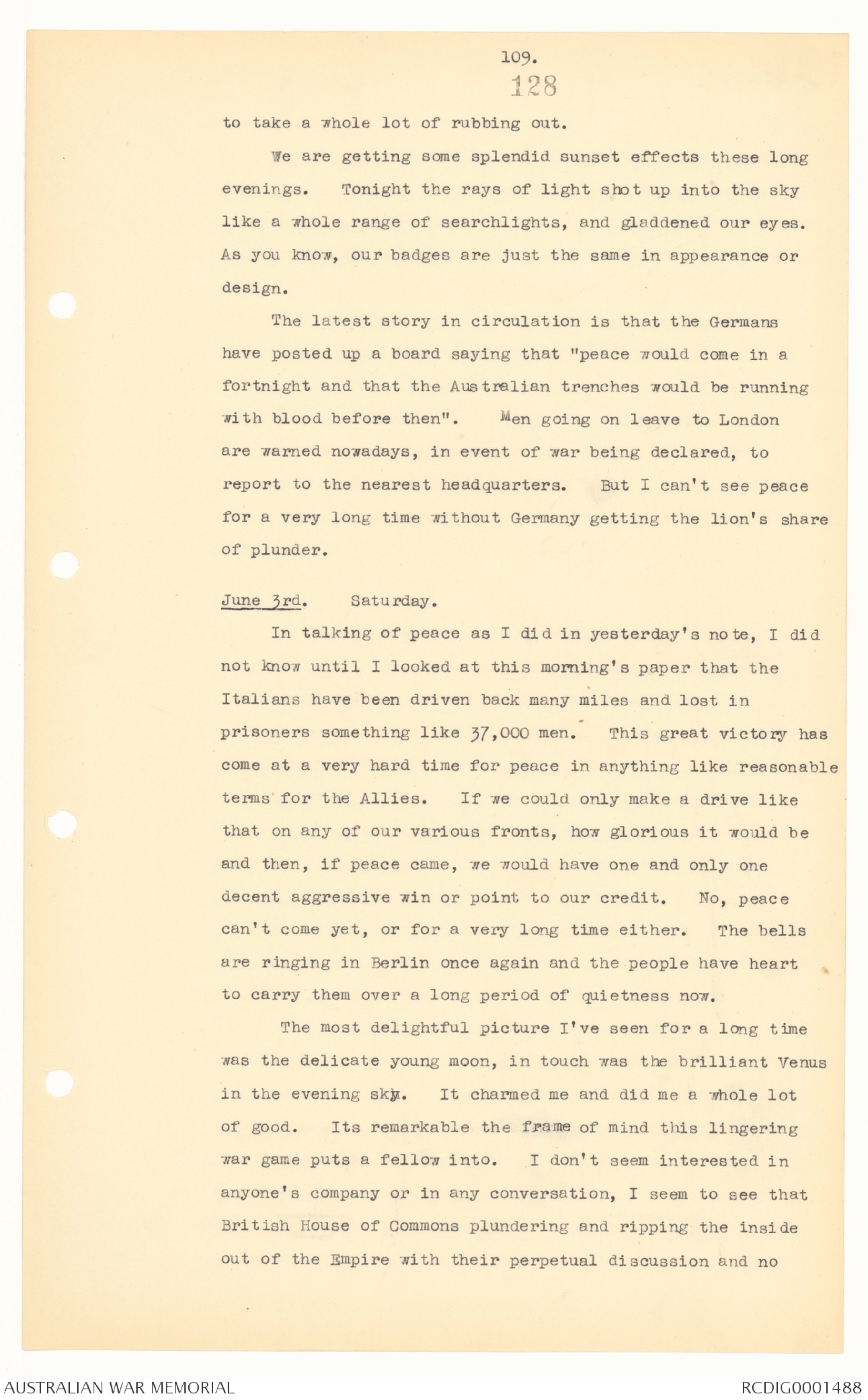
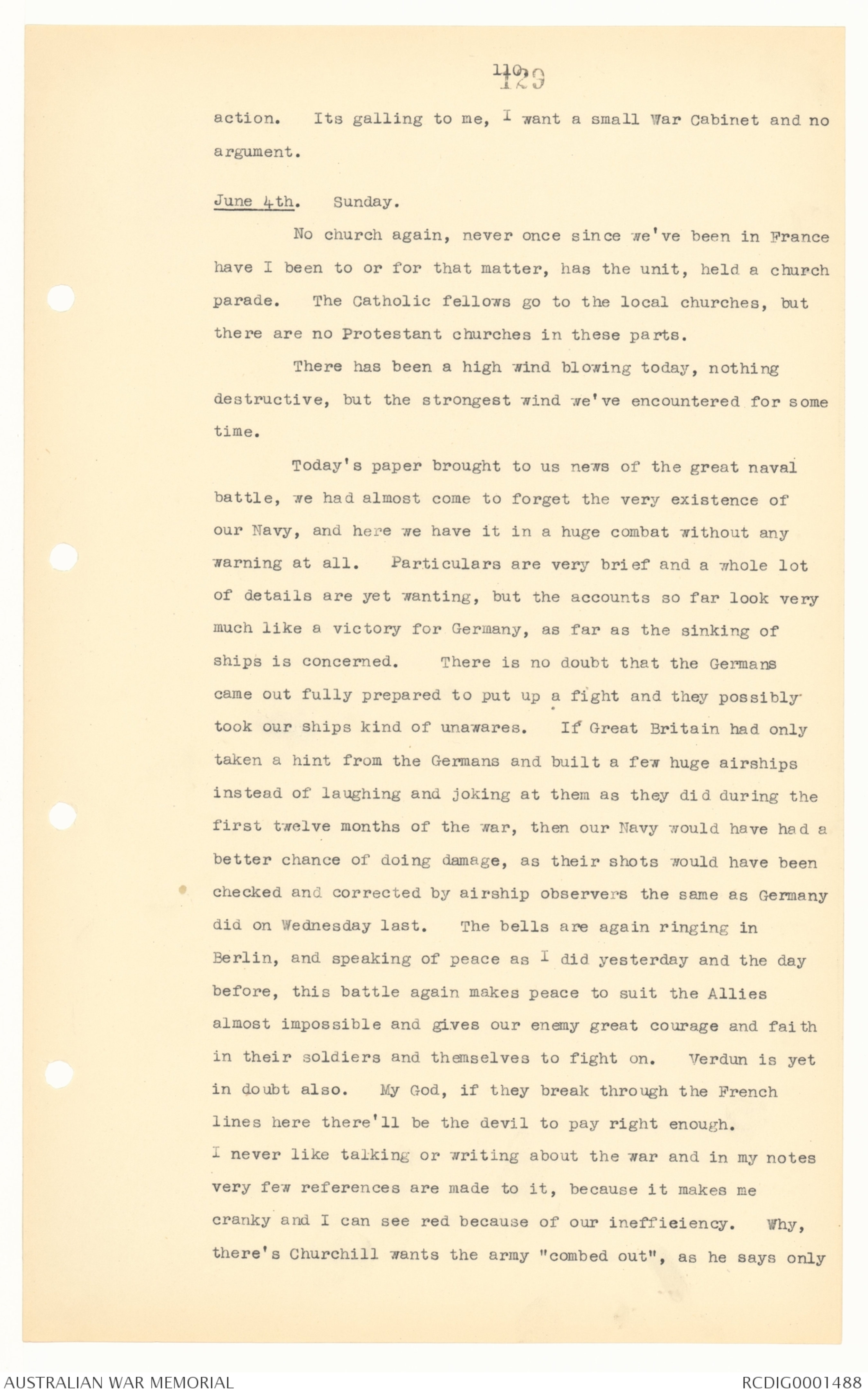
120.
tea and it was a treat to see these kids relishing it. The
hostess sewed a button on my coat and we left with a somewhat
affectionate parting. Bill and I went down to the estaminet
where the school teacher and several other fine girls hold
out. They all had a drink with us while the room full of
Tommies sang very pleasantly. These women were indeed glad
to see us. There was no mistaking their good feeling and
kindly interest. I promised to call back one day and have
a chat with them when they were not so busy. I will run
back one day too . It was indeed pleasing to me to see the
way the people of this village recognised that we were
Australians and looked after us with an expression on their
faces that seemed to say they were glad to see us and would
be pleased if we came back again. I asked the school teacher
how the Australian fellows compared with the Tommy for
behaviour. She replied, "Oh, well, there's not much
difference, only when the Australian is sober, he's better
than the Englishman, but when he is drunk he's awful."
When these four women accepted my invitation to have a
drink, they drank wine, so did I, but Bill Drummond drank
coffee. Now, on getting back home we were talking in the
pantry and Drummond said that he had no objection to drinking
himself but in the hope of preventing others from drinking,
and so as to in no way help and assist them but giving a lead
he would sooner go without than drink at all. This policy
may sound alright, but it is at the same time one of much
weakness. I maintain that my policy of moderation has
carried more weight with our boys by 20 times than Bill's
policy. And what is more, he gets left out of many a
pleasant little affair through it and loses the opportunity of
getting into touch with the heavy drinkers and trying to
influence them to become more moderate and by setting an
example show them the folly of extremes.
As matters stand now with Bill Drummond, I will take
good care that he does not come to Outtersteen with me next
121.
trip as I want to sit down over a bottle of champagne and
have a congenial chat with these women, this cannot be done
with Bill as he will drive them to all kinds of trouble to mix
up coffee and this is certain to spoil the the ease and
ruffle the minds of thefolk. No, Drummond's policy is wrong
both in his own interests and more especially in the interests
of the drinkers that he would so much like to show an example
to, but cannot get into direct communication with. Drinking
is a habit that may grow on any man sooner or later in life,
but there is less chance of this happening if a fellow knows
the value of moderation. Moderation can give a man the
congenial association that go with wine etc. The teetotaler
misses this, and also runs the risk of becoming a drunkard
later in life because he does not recognise the value of
moderation. Anyhow, the non-drinker gets a rough time here
in France, as there is nothing to drink, the water is bad
and is not allowed to be drunk unless chlorinated, and then
it is too distasteful to drink, The pubs don't cater for
the non-drinker at all. Some of them carry citron and water.
May 25th. Thursday.
The Anzac books arrived and were distributed to those
who had ordered them while in Egypt 3 months ago. The size
and style of print is very similar to "Printer's Pie". Some
of the black and white sketches are particularly characteristic
of Anzac, but also the colouring on most of the coloured
sketches is awful. One, the head of a Turk, looks just like
several Turks I saw after they had been lying over in No Man's
Land for weeks, and brought home to me some very unpleasant
recollections. The reading matter as far as I went was very
good indeed, but I have not finished with it as yet.
I ordered five copies of this Anzac book to be
forwarded to mother, Uncle Ned, Morgan, Williams and I think
Mrs. Hunter for the fifth one. Anyhow, I wish I had ordered
several more of them now, as there is Jim Miller and Edgar
Brice and others also.
122.
May 26th. Friday.
We have 100 full diet patients and 35 light diet men
here. They all speak very well of their food and general
treatment more so as they are permitted to wander out each
evening and as long as they behave reasonably well there will
be nothing said or done. I wrote 8 pages to Miss B.
McClosky of the Lower Burdekin. I put on a frivolous kind
of an air, and was surprised at the decent showing I made up.
There was some remarkable shooting up in the sky just
at dusk tonight. For quite 20 minutes we could see the
flashes in the same portion of the firmament, sometimes from
4 to 7 flashes almost simultaneous. The bursts looked most
remarkable and made us think of what an exciting game the
aviation really is.
There has been much ado in religious circles in our
village of Doulieu. This morning at 7 o'clock there was a
huge procession wandering about the streets as though they
were asking some special blessing or driving out some evil
spirit. A priest told me some time ago that the people have
only been patronising the Church since the war commenced, and
as we know the French Government recognise or support no
religion, but then judging by the religious amulets that
adorn every house in the country, one would think that the
people were intensely religious.
May 27th. Saturday.
My greatest surprise and delight for a very long time came
when I opened a strange looking envelope and withdrew a
postcard photo of my esteemed friend, Rev. John Howard. His
letter, typewritten, was brief, but very soothing to me. Rev.
John Howard is one of the men that I have the greatest
admiration for. He seems to carry with him the courage of
his own convictions, and during a tram strike in Johannesburg
he openly criticised the police for their mad methods in trying
to bully the strikers into submission. At the same time,
Rev. Howard is beaten and bewildered at the ineffectiveness of
123 104.
religion on the young man. He realises that there is something
missing, it has no charm, it has lost its dash and sparkle in
the wide world glamour for gaiety and pleasure. Religion carries
with it a morbidness that the so-called modernly educated
mind cannot grasp the significance of. He promised to give
me a missionary post in Africa if I went into it and studied
for six months. I am sorry for him and every decent parson I
have had the pleasure of meeting. A letter from father is
also good reading, but I believe he is slowly fading.
May 28th. Sunday.
It has been a splendid day again today. As usual the
first thing we hear on a clear morning is the bombardment of
the aeroplanes going on.
The third Field Ambulance came along today with a good
team and played us a very pleasant game of football on the
cow field next door. The grass was lovely and soft, but so
slippery that one could not venture to move sharply, this
brought forth some funny incidents. We won by four trys and a
penalty goal to nothing, after one of the most pleasant games
I've played in. There was a good crowd present and they
enjoyed the game immensely.
I wrote and posted a long letter to the Rev. John
Howard tonight. I may not have stuck directly to the truth
but wherein I failed will not hinder anybody or gain me ought,
therefore I have lied not in vain, as it will do good at least.
The sunsets are becoming very pretty indeed just now
and the days continue to lengthen appreciably. It is at the
moment of writing, 8 p.m. I am not going about much, I am
determined to catch my correspondence up.
May 29th. Monday.
There is nothing to chronicle tonight. I badly want
to go to Outtersteen to see the folk there, I am staying about
the camp too much. I've written a six page letter to
Mrs. Griffiths.
105. 124
May 30th. Tuesday.
I have written to C. Sponza and Andy Prowse today, but
Oh, it takes me a long time to write a bit of a letter. We
arranged for a concert party to turn up tonight and, after
arranging the mess rooms, they failed to turn up. This is
awfully annoying and in military circles is really a clear
disgrace for soldiers to be so disappointed. There were
quite 200 men waiting and have now lost faith.
For two hours, we have indeed had a lively bombardment
tonight. It is now 10 o'clock and the guns seem to have
quietened down a whole lot.
Later. I have learned that the heavy bombardment tonight
was accountable for 400 casualties, chiefly 10th and 11th Bns.
The Germans blew our parapets to blazes and made an attack
which our men easily checked. What damage our guns did we
cannot of course tell. But our artillery were not silent
and as these trenches are easily levelled, I guess the Germans
lost some, too.
May 31st. Wednesday.
I could not stay about any longer, so this afternoon I
went out for a decent walk towards Outtersteen. I went
looking for an easy road, and when I came to a point where
the road turned abruptly to the right and as my sense of
direction told me it would be better to continue straight on,
I took to crossing the farms, and enjoyed my walk through the
open fields, there being no dividing fences at all. The
crops and potatoes are coming on splendidly; it seems hard to
see the women and girls weeding and chipped all day long,
anyhow, on the return journey I decided to find out just what
became of that road that swung around the wrong way - to my
surprise I found that it took a left angle turn down 200 yds.
and continued along in the direction that I most wanted it
to go. These roads wind and swing in all directions, but I
know I did wrong in not following the road all the same.
At Outtersteen, I had tea of eggs and a tin of pineapple.
106. 125
The Y.M.C.A. fellows were amused at my ideas of things in
general, and I enjoyed a little while with them. And my old
estaminet - I met the two girls (the school teacher was, alas,
absent). With some bad French I showed them some photos. and
after a bottle of champagne, I walked the four miles back to
camp in the lovely gloaming 8.30 p.m.
June 1st. Thursday.
Today was a big day for the 1st Brigade as Billy Hughes,
Andy Fisher, General Birdwood and stall received the men. I
regret not being there, only the men we could spare were sent.
I hear that General Birdwood must have warned and restricted
Hughes considerably in his speech as he was brief, and labouring.
He said that Australia realised full well that you are
fighting and dying for her, and when you come home rest
assured that Australia will welcome and look after you for the
rest of your days. Good stuff, yes, but Oh, how useless for
the general welfare of the coming generation of Australia, the
fathers of whom will be medical rejects and cold footed
malingerers who kidded sick and returned to their homes "heroes".
No! if Australia does not want to reduce both the size and
courage of the coming generation, its up to them to pick out
of the battalions, men with clean sheets and free from
venereal disease and return them to Australia at once. Its
the men whose constitutions are sufficiently strong enough to
withstand the past two years that the First Contingent has
withstood, to be fathers of our young nation. Then by
enforcing conscription, would the ranks be kept up to full
strength. Its sickening to think that, like France with its
revolution and wars lowering the strength and physique to
such an ebb that it was never regained. France will never
recover from this war, I venture to think that as a nation
they cannot ever again protect themselves from an action.
Germany will have much trouble to regain her former strength,
but I believe she will do it considerably quicker than any
other nation as she has a sturdy foundation, is not curbed by
107. 126
superstition etc., and has modern teachers and scientific ways
with her that can regulate and protect the coming generation.
Australia should take the lesson from France, and not allow
her bravest and her best to be killed off; take them home,
they have proved themselves and replace them with untried men.
We have plenty of them.
Today, it was strange that Andy Fisher did not say a
few words to the boys. Moreso strange, as he seemed entirely
out of his element and just moped along behind Hughes and
Birdwood right out of the game altogether. The review was
held in a paddock that may or may not have been out of range
of the enemy's gun range, but to give every possible protection
there were some 8 or 10 aeroplanes flying around to keep off
the enemy bomb droppers. The Germans would have had a
glorious time had they got amongst this body of probably 4,000.
men. Mr. Hughes and party came around and shook hands with all
of the O.Cs. The brass band played its best, and when
Mr. Hughes said that General Birdwood had allowed him to call
for three cheers for Australia, they were so heartily given
that they could be heard all the way to Berlin. Then one
cheer for "Birdy" was called, and by way of expressing his
popularity, the men cheered 4 or 5 times. Andy Fisher, also,
seemed lost at having to play second fiddle, he was out of it
and to our boys it was rather pathetic.
As I sat in the mess room writing these notes half an
hour ago, I was called out to see the German guns blowing
blazes out of one of our observation balloons. Whether they
hit it or not, I don't know, but they fired some hundreds of
shots and I caught my breath many times at the nearness of the
shots. When the artillery attacked the balloon, they
immediately sent it up some 6,000 into the air. I expect the
idea was so that they could not get the accurate range as they
108. 127
lowered and let out the rope that held it. Anyhow, I guess
it was a very exciting 20 minutes for the observer and also
that he was glad when the evening lights gave place to
darkness, so that he could come down. He's a lucky man if
he did dome down alive.
June 2nd. Friday.
The Church at Doulieu was used by the Germans for
storing petrol in when they were compelled to retreat early in
the war and as they could not take it with them, they set it
on fire and naturally the church was burnt right out. Some
people tell the story differently to this and make out the
Germans to be terrible men, but by what I find they were no
worse than might be expected when they were in possession of
this country around here. War is hard, only hard measures
can meet them, and keep up to it. I wish the British at
home could realise this and throw their whole weight into it
without so much argument and noise.
I went into a nearby field this afternoon to look up
some of the strange birds which we, from birth, have heard so
much about, preferably the "cuckoo". All I found was a
blackbird on the topmost branch of a cherry tree, and he was
very anxious about and seemed to be calling someone moreso
than singing just to amuse himself. This blackbird brought
home to me a song, "Cheerily we listen to the blackbirds sing",
that was sung at an anniversary of the Sunday School when I
proudly sat up on the platform erected in the church some
years, more years almost than I dare attempt to count, ago.
Beautiful as this blackbird sang, there was a weird,
plaintive note running through his broken melody. I must
pay more attention to these birds, there's the skylark, the
nightingale, the thrush and others I have yet got to pick out,
although I believe I've already heard them, at any rate, I
often hear clear tones ringing out in the morning, but I don't
know to whom the credit belongs. As far as I have yet gone.
not far I confess, our lovely old Queensland magpie is going
109. 128
to take a whole lot of rubbing out.
We are getting some splendid sunset effects these long
evenings. Tonight the rays of light shot up into the sky
like a whole range of searchlights, and gladdened our eyes.
As you know, our badges are just the same in appearance or
design.
The latest story in circulation is that the Germans
have posted up a board saying that "peace would come in a
fortnight and that the Australian trenches would be running
with blood before then". Men going on leave to London
are warned nowadays, in event of war being declared, to
report to the nearest headquarters. But I can't see peace
for a very long time without Germany getting the lion's share
of plunder.
June 3rd. Saturday.
In talking of peace as I did in yesterday's note, I did
not know until I looked at this morning's paper that the
Italians have been driven back many miles and lost in
prisoners something like 37,000 men. This great victory has
come at a very hard time for peace in anything like reasonable
terms for the Allies. If we could only make a drive like
that on any of our various fronts, how glorious it would be
and then, if peace came, we would have one and only one
decent aggressive win or point to our credit. No, peace
can't come yet, or for a very long time either. The bells
are ringing in Berlin once again and the people have heart
to carry them over a long period of quietness now.
The most delightful picture I've seen for a long time
was the delicate young moon, in touch was the brilliant Venus
in the evening sky. It charmed me and did me a whole lot
of good. Its remarkable the frame of mind this lingering
war game puts a fellow into. I don't seem interested in
anyone's company or in any conversation, I seem to see that
British House of Commons plundering and ripping the inside
out of the Empire with their perpetual discussion and no
110. 129
action. Its galling to me, I want a small War Cabinet and no
argument.
June 4th. Sunday.
No church again, never once since we've been in France
have I been to or for that matter, has the unit, held a church
parade. The Catholic fellows go to the local churches, but
there are no Protestant churches in these parts.
There has been a high wind blowing today, nothing
destructive, but the strongest wind we've encountered for some
time.
Today's paper brought to us news of the great naval
battle, we had almost come to forget the very existence of
our Navy, and here we have it in a huge combat without any
warning at all. Particulars are very brief and a whole lot
of details are yet wanting, but the accounts so far look very
much like a victory for Germany, as far as the sinking of
ships is concerned. There is no doubt that the Germans
came out fully prepared to put up a fight and they possibly
took our ships kind of unawares. If Great Britain had only
taken a hint from the Germans and built a few huge airships
instead of laughing and joking at them as they did during the
first twelve months of the war, then our Navy would have had a
better chance of doing damage, as their shots would have been
checked and corrected by airship observers the same as Germany
did on Wednesday last. The bells are again ringing in
Berlin, and speaking of peace as I did yesterday and the day
before, this battle again makes peace to suit the Allies
almost impossible and gives our enemy great courage and faith
in their soldiers and themselves to fight on. Verdun is yet
in doubt also. My God, if they break through the French
lines here there'll be the devil to pay right enough.
I never like talking or writing about the war and in my notes
very few references are made to it, because it makes me
cranky and I can see red because of our inefficiency. Why,
there's Churchill wants the army "combed out", as he says only
 Diane Ware
Diane WareThis transcription item is now locked to you for editing. To release the lock either Save your changes or Cancel.
This lock will be automatically released after 60 minutes of inactivity.